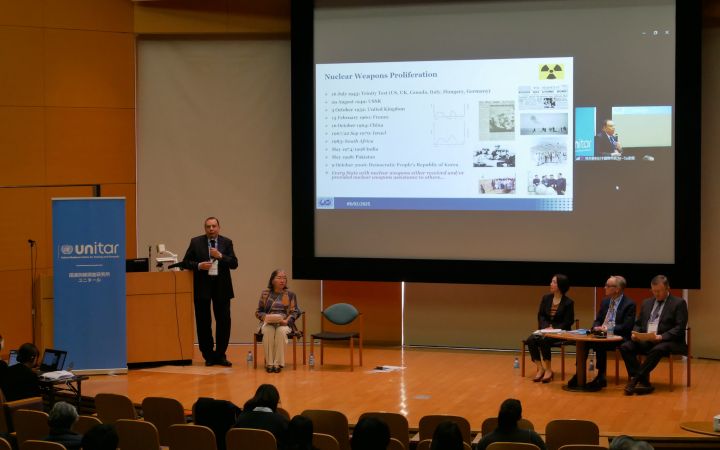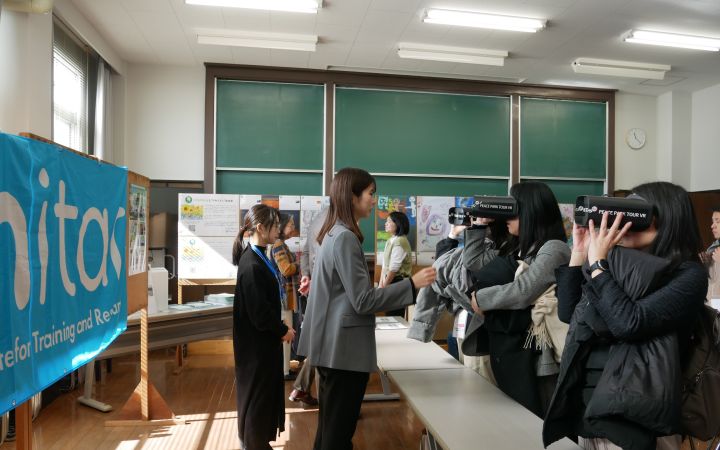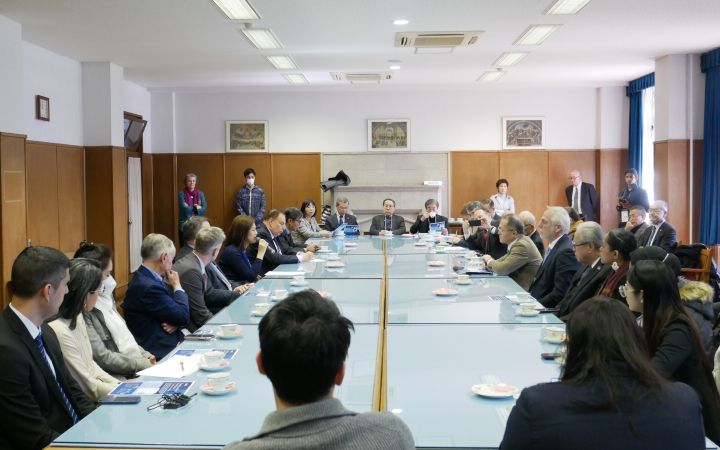UNITAR, in collaboration with the Japan NGO Network for Nuclear Weapons Abolition (JANA), hosted a public event in Tokyo as part of the two-day International Civil Society Forum to Abolish Nuclear Weapons .
- Three UNITAR training advisors were among the panelists, who shared their insights on UN actions for nuclear disarmament and global trends in the nuclear disarmament debate.
- UNITAR also collaborated with Tabimachi Gate Hiroshima Co., Ltd. and Fujita Corporation to introduce a Virtual Reality (VR) experience conveying the realities of the atomic bombing during the exhibition session.
- UNITAR training participants - 15 diplomats from 14 Asia-Pacific countries - also attended the first day of the event organized by JANA and had an opportunity to engage in dialogue with civil society groups, experts and individuals from Japan and beyond.
9 February 2025, Tokyo, Japan - On 9 February 2025, the United Nations Institute for Training and Research (UNITAR) Hiroshima Office, in collaboration with the Japan NGO Network for Nuclear Weapons Abolition (JANA), hosted a public event in Tokyo as part of the two-day International Civil Society Forum to Abolish Nuclear Weapons (8-9 February 2025). This year marks 80 years since the atomic bombings of Hiroshima and Nagasaki, and the event brought together experts, activists and people from various sectors of society to reflect on today's heightened risk of the use of nuclear weapons. The session underscored the urgency of passing on the lessons from Hiroshima and Nagasaki and continuing broad-based dialogue and multilateral diplomatic efforts to prevent such tragedies from happening again.
Multilateral Diplomacy for Nuclear Disarmament Today
The event's first session, "Recent UN Trends in Nuclear Disarmament," aimed to foster understanding of the public - including students, youth and civil activists - about UN actions for nuclear disarmament and to raise awareness of global trends in the nuclear disarmament debate.
The expert panellists included three advisers to UNITAR training programmes - Mr. Tariq Rauf, Former Head of Verification and Security Policy, International Atomic Energy Agency (IAEA), Mr. Tim Caughley, a Non-Resident Senior Fellow for the United Nations Institute for Disarmament Research (UNIDIR), and Mr. Yuriy Kryvonos, a former Director, United Nations Regional Centre for Peace and Disarmament in Asia and the Pacific (UNRCPD) - as well as Ms. Junko Horibe, Associate Professor, Nagoya University of Foreign Studies. The session was facilitated by Chisa Mikami, Head of the UNITAR Hiroshima Office.
The panellists offered valuable insights into today's security and diplomacy challenges and ongoing multilateral efforts, including the upcoming 2026 Review Conference of the Parties to the Treaty on the Non-Proliferation of Nuclear Weapons (NPT), which is central to the UN-based multilateral framework for nuclear disarmament.
As the world today faces growing risks of nuclear weapons use, Mr. Rauf emphasized the urgency of recommitting to multilateral efforts for nuclear disarmament. "Creating space for international organizations, civil society and diplomats to come together remains crucial in ensuring progress in the right direction," he stated, pointing to the day's event as a prime example of fostering meaningful dialogue and collaboration.
Passing on the Realities of the Atomic Bombing
In the public event's second session, "Experiencing the Impacts of Atomic Bombing Through Virtual Reality (VR)," UNITAR collaborated with Tabimachi Gate Hiroshima Co., Ltd. and Fujita Corporation to introduce a VR experience conveying the realities of the atomic bombing.
A video message from Mr. Dai Tamesue, UNITAR Goodwill Ambassador, was shared with the participants. Mr. Tamesue, a third-generation atomic bombing survivor from Hiroshima, emphasized the challenges in conveying the horrors of nuclear weapons without the ability to share the experience itself and highlighted the potential of VR to fill the gap.
For my grandmother, the experience of the atomic bombing was so profound that it was beyond what words can describe. I think the difficulty in passing on the tragedy of war is that experiences cannot be conveyed through words alone. [At this event] you will experience the reality of the atomic bombing through VR. I hope it will motivate you to convey to others the horrors of the bombing and how we can achieve world peace. - Mr. Dai Tamesue, UNITAR Goodwill Ambassador.
The VR experience allowed participants to witness the catastrophic reality of the atomic bombing in Hiroshima and gain a deeper understanding of the inhumanity of nuclear weapons. UNITAR continues to explore and implement creative solutions and partnerships to pass on the lessons from Hiroshima to future generations, ensuring that these critical memories will not fade.
"The panelists shared invaluable insights, making complex topics-such as the latest developments regarding the NPT and the discussion on nuclear security-easy to understand. Additionally, the VR session following the panel was an impactful experience. It vividly recreated the aftermath of the atomic bombing, allowing me to feel the overwhelming situation and wonder where people could possibly go from there. - Participant in the UNITAR sessions
Together for a Nuclear-Weapon-Free Future
On the first day of JANA's International Civil Society Forum, 8 February, UNITAR brought 15 diplomats from 14 Asia-Pacific countries to the public forum by JANA, "Imagining and Creating a World without Nuclear Weapons," which explored the vision, rationale and citizen-led actions necessary for achieving a nuclear-weapons-free world. UNITAR training advisor Mr. Rauf joined the floor as a panelist.
The diplomats were in Japan to complete the UNITAR Hiroshima Nuclear Disarmament and Non-Proliferation training programme . On this final day of the training, their participation in the Forum allowed them to engage in dialogue with civil society groups, experts, diplomats and individuals from Japan and beyond, enriching their perspectives and providing inspiration for collective actions towards the common goal of nuclear disarmament. With this, the training programme concluded for the diplomats.
JANA is a coalition comprising over 20 civil society organizations and individuals dedicated to realizing a world free of nuclear weapons. The close partnership with JANA builds upon UNITAR's ongoing efforts to promote a nuclear-weapon-free world. Through continued partnerships and educational initiatives, UNITAR remains committed to empowering people and communities to take action towards a safer and prosperous world.









